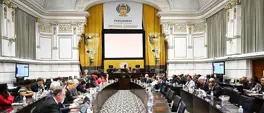JUDITH FEBRUARY & CHRIS OXTOBY | Legal Sector Code controversy must not be ignored
Judith February
22 August 2025 | 10:12Amidst all the political scandals and crises assailing South Africa, the controversy over the Legal Sector Code is in danger of being overlooked, warns Freedom Under Law. Here's why it should not be ignored.

Picture: Pexels.com
Call it scandal fatigue, shrinking bandwidth, or something else, but it is a feature of South African political life that keeping track of the sheer number of controversies and crises (potential or actual) that break on a seemingly constant basis can be exhausting and distracting.
In recent weeks, one can think of the allegations by KwaZulu-Natal police commissioner Nhlanhla Mkhwanazi about organised crime infiltrating the highest levels of government, which has led to the suspension of the Minister of Police and the establishment of a commission of inquiry; the attempt to bribe Daily Maverick journalist Pieter-Louis Myburgh in what appears to have been a ham-fisted effort to halt and investigation into corruption at the Independent Development Trust; and controversy over the commencement of a national dialogue of questionable utility but enormous cost.
These are all serious matters deserving of our attention.
But one of the dangers of being assailed by such regular crises is that issues which are less obviously dramatic, but may nevertheless have a serious impact, canbe overlooked.
One such example is an ongoing controversy over the Legal Sector Code, which has received relatively little public attention but raises some important considerations about how transformational initiatives are best pursued, and their potential impact on the independence of the legal profession and the rule of law.
The Code was promulgated under the Broad-based Black Economic Empowerment Act and came into effect in 2024. It imposes various requirements on law firms (precisely which law firms is one of several points of controversy, as we will see) relating to issues of equity ownership, management control, skills development, procurement, and socio-economic development. The Code also mandates the establishment of a Legal Sector Charter Council to monitor compliance with the Code.
The Code is intended to address issues which are seen to hinder transformation in the legal profession, such asexclusionary briefing patterns, a lack of access to quality work and to leadership positions, and few would question that these are laudable goals. However, the way in which it seeks to achieve these goals has been highly controversial, to the extent that several large law firms are currently involved in litigation to have the Code set aside.
Concerns with the Code include that it does not recognise how large law firms operate in practice; that it sets unrealistic ownership targets; that it disregards the transformation initiatives undertaken by large law firms; that it excludes non-lawyers when evaluating the management composition of large firms; that it focuses too narrowly on what firms spend on briefing black advocates whilst ignoring what is spent on other black-owned service providers; and that it fails to take into account the role that large law firms play in attracting foreign direct investment.
Critics also contend that the Code applies to less than5% of law firms, thereby excluding the majority of firms from the Code’s transformational requirements. This, it is argued, undermines the core purpose of the Code.
On the face of it, the debate might seem to pit familiar South African tropes against each other, with champions of the Code being seen as champions of transformation, with critics painted as reflexive defenders of privilege (the fact that both Solidarity and AfriForum are opposed to the Code serves to reinforce this divide). However, a closer look at the underlying issues suggests that the debate is one that deserves far more public attention, and careful consideration as to whether the measures being introduced do indeed further the lofty goals they purport to achieve.
Why does this matter? Many people may find a small group of large commercial law firms to be a constituency undeserving of their support. But there are good reasons to be cautious about rushing to judgment, and to give serious consideration to the criticisms of the Code which have been raised.
For starters, there are international and regional standards for how the legal profession is to be governed. These instruments consistently emphasise the need for lawyers to be independent, and to be able to fearlessly represent the interests of their clients, without restriction or interference, as well as for clients to be able to select the lawyer of their choice. This is not to say that initiatives to address historic inequalities will invariably fall foul of these standards. But great care ought to be taken to ensure that such fundamental principles are not undermined, particularly by measures which may in any case not achieve the transformational goals they purport to.
The debate is also extremely significant as it occurs in a context where the rule of law and the institutions that support it are under increasing attack globally.
In the United States, the actions of the Trump administration in targeting law firms perceived to have opposed the president’s interests have led to firms withdrawing from important pro-bono work, with devastating consequences for accountability and the rule of law. In South Africa, many large corporate firms have done important pro bono work, which has generated celebrated jurisprudence. There ought, therefore, to be extreme caution about the potential for unintended consequences of the Code if these aspects of law firms’operations are not properly considered.
These factors make it important that the debate about the Code forms part of a broader national engagement with how redress for past inequality is best achieved. It is important that the issues are not looked at in binary terms, where one is either for or against transformation without making room for serious, nuanced discussion of how transformation is best to be achieved.
Get the whole picture 💡
Take a look at the topic timeline for all related articles.

















